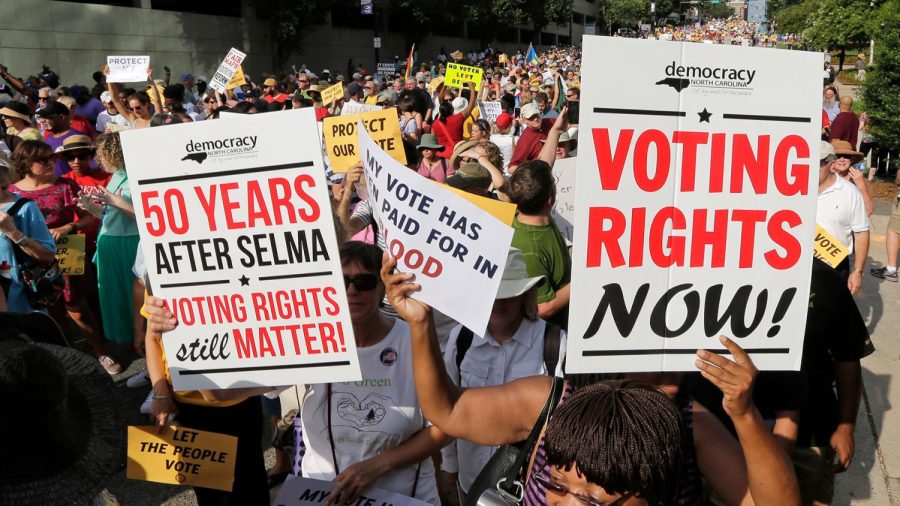Voter suppression is deeply American
Voter suppression is a historic practice that continues to be visible in American politics today
Courtesy of the Southern Poverty Law Center
Protestors march against voter suppression, carrying signs that call back to the Civil Rights Movement.
October 19, 2022
It is impossible to discuss modern voter suppression without bringing up Georgia. Everyone talks about the dichotomy of the state of Georgia: on the one hand, you have the thriving metropolis of Atlanta, a heavily urbanized city, dominated by multiculturalism, hosting an incredibly diverse population who largely vote for Democrats. On the other hand, you have rural, traditional Georgia, which largely consists of white Americans who lean conservative and overwhelmingly vote Republican. Georgia is a microcosm of the larger United States — it contains shades of New York and shades of Wyoming within its multitudes. However, the state legislature is controlled by Republican candidates and has been for some time, which is why, when the state voted blue in 2020, a whole new conversation regarding voter suppression arose.
In the years following the 2020 general election, the term “voter suppression” has become a household phrase within America’s political atmosphere. Irrespective of your side of the aisle, you’ve likely discussed policies that seem to be geared toward suppressing the minority vote. But voter suppression itself is not a new feature of American politics; in fact, it’s a part of America’s historical “democracy”. As Alzo Slade stated in his video in collaboration with VICE media, voter suppression is the American way.
If you took AP U.S. History in high school, you know all about the historic 15th Amendment that granted African American men the right to vote, solving the historical injustice of unequal voting rights within the United States. Except, it didn’t, because women still couldn’t vote. Then, the 19th amendment was passed in 1920 granting white women the right to vote, and voting finally became an egalitarian process. Except it didn’t, because southern states such as Alabama, Mississippi and even North Carolina used literacy tests amongst other racist policies enacted with the sole purpose of disenfranchising Black voters (and some working-class white voters) during the Jim Crow era. Then, in 1965, the Voting Rights Act was passed, which outlawed literacy tests and ordered certain states with a history of passing racist voting legislation to have the federal government approve any new voting-related policy from there on out. And finally, the problem of unequal voting rights was solved.
Except it wasn’t, because portions of the Voting Rights Act of 1965 were overturned by the Supreme Court in the 2013 case Shelby County v. Holder. Following this decision, GOP lawmakers presented a variety of bills that seemingly aimed to accomplish one common goal: to prevent certain demographics from voting.
In the modern era, contrary to what Georgia governor Brian Kemp might have you believe, this racism still exists. The overarching injustice of voter suppression is still alive and well, and has taken on many different faces. Last year, a plethora of restrictive voting bills were passed by Georgia’s state legislature aimed at suppressing the vote in the state’s urban areas. Senate Bill 325 heavily curbed the usage of drop boxes, and it’s no coincidence that over half of the absentee voters that relied on these drop boxes lived in four metro Atlanta counties: Cobb, DeKalb, Fulton and Gwinnett. It’s also no coincidence that about 50% of the voters in these counties are people of color. Yet, despite all of these non-coincidences, a U.S. District Court judge did not find these new voting provisions unconstitutional at all. And this is just the tip of the iceberg when it comes to the true extent of enacted voter suppression in Georgia, the same state whose legislature produced 22 restrictive voting bills in the 2021 legislative session.
Gov. Brian Kemp bears some semblance to a kind of figurehead of voter suppression. He continues to sign bills perpetuating disenfranchisement by limiting early voting, voting by mail and the use of ballot boxes, even supporting the decision of GOP lawmakers to criminalize handing out water to people waiting in line to vote. Even more interesting is Kemp’s position prior to becoming the governor of Georgia— he used to serve as Georgia’s secretary of state, tasked with overseeing elections, appointing members of boards of elections and certifying election results. Essentially, Kemp oversaw the 2018 gubernatorial election, which he won. Considering his track record, I think it’s safe to say that if this election was redone in circumstances that actually allowed minorities to vote, the results would have been incredibly different.
In North Carolina, 40 out of 100 total counties were required to seek federal approval before altering any election-related legislation under section 5 of the Voting Rights Act. Considering that this exact section was the biggest point of contention in Shelby County v. Holder and was ultimately overturned, it is no surprise that suppressive legislation came into effect almost immediately. In 2016, a federal appeals court had to cut down sections of an elections bill including a voter ID mandate presented by the state, that the court believed attempted to disenfranchise Black voters with “almost surgical precision”. The bill essentially stated that government-issued driver’s licenses would be acceptable as identification at the polls but government-issued public assistance cards would not be. This seems mundane enough until you realize that public assistance cards are used disproportionately by minorities in NC. Of course, North Carolina’s state legislature which consists largely of Republicans was absolutely furious at this ruling, with then-Governor Pat McCrory stating that these stipulations were needed in order to avoid voter fraud. The same voter fraud that doesn’t actually exist, or that voter identification laws have little to no effect on, in accordance with a study conducted by Enrico Cantoni at the University of Bologna and Vincent Pons at Harvard Business School.
These suppressive tactics don’t actually accomplish any of the goals that GOP lawmakers claim they do, but that isn’t even the main issue. It’s the fact that the perpetuation of this ignorance has been instrumental in rallying millions of Americans behind policies that suppress minority votes, whether or not these people understand the true effect of this legislation. The threat to democracy that this kind of ignorance poses isn’t a back-burner problem anymore; it has developed into an incredibly pertinent issue front-lined by a former president who continues to posit baseless claims that mail-in ballots allow for the possibility of massive voter fraud and deny the outcome of one of America’s most significant elections. This has caused voter suppression in and of itself indirectly, with GOP lawmakers and supporters supporting Trump calling for an end to early voting and mail-in ballots. Essentially, the GOP will continue to lie about the true purpose of their proposed election-related legislation in order to make the disenfranchisement of minorities more palatable to the people.
The fact that voter suppression continues to evolve in accordance with America’s social and political climate is a testament to how deeply our nation is divided along party lines. Ultimately, voter suppression is incredibly intertwined and deeply embedded into not just American history, but present-day American politics. Despite the fact that it continues to undermine American principles of freedom and democracy, voter suppression is deeply American.















